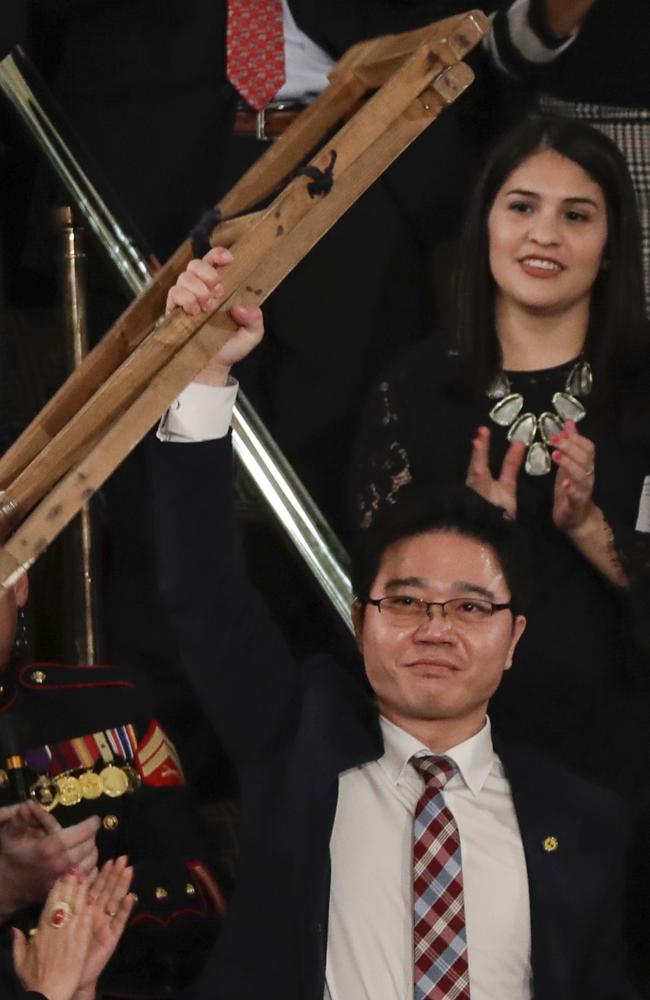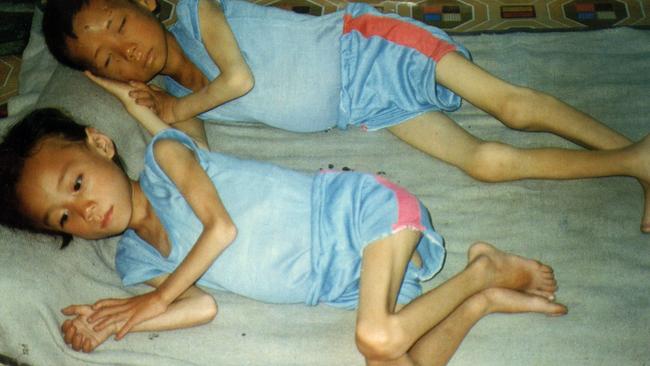Hero defector: ‘The dogs in China ate better than my family in North Korea’
THE incredible journey of Ji Seong-ho, the double amputee who hobbled 10,000km on crutches to escape North Korea’s brutal regime.
He earned a standing ovation when hailed as a hero this week.
But when he escaped North Korea, Ji Seong-ho was literally a broken man, with two limbs amputated, somehow making an impossible journey on crutches.
The story of the double-amputee’s defection is as heartbreaking as it is remarkable, and was retold by US President Donald Trump, who hailed him as a hero during his State of The Union address this week.
As his story was lauded by the crowd, Ji stood, and raised his crutches in the air in acknowledgment.
They are a humble reminder of the incredible feats of a man who was so determined to be free that the loss of an arm and a leg could not stop him.
Life under the North Korean regime had cost him enough already. It would not cost him his life.

EATING GRASS AND RATS
In 1996, Ji was a starving teenager in a country in the grip of famine.
The outside world didn’t know it, he and his siblings in the north Hamgyoung province of Hoeryong, North Korea, weren’t alone in being so hungry they were forced to resort to eating grass and rats to survive.
Sometime in the previous four years, North Korea’s public food system had collapsed.
Ji had started to notice it at school — a growing number of empty desks were appearing in his classroom, he said in 2015 address titled “My Impossible Escape from North Korea” to the Oslo Freedom Forum.
By 1994 many more residents, and classmates, had died of starvation, he said.
Some tried to eat tree bark and grass “but they too ended up dying,” he said.
In 1995, he watched his grandmother die of hunger.
As the death toll rose and the famine tightened its grip, the North Korean regime continued to insist all was well.
Ji’s teacher ignored the empty desks, to “continue to push the notion that our happy system of socialism was the best in the world”.
As then-leader Kim Jong-il assured his people the food would soon “flow like a waterfall”, the public system had broken down.
Ji says he later learned the leader had withheld food from the places the famine was worst, hastening the deaths by starvation.
HE WOKE UP AS THE TRAIN HIT
Desperately poor, and desperately hungry, Ji tried to steal a handful of pieces of coal from a train in the hope he could trade it for food for himself and his siblings.
He’d done it before — grabbing the freight train to avoid the guards who policed it on its journey from coalfields. Sometimes, he’d been caught, and was horrifically beaten.

This time, the 14-year-old who weighed just 20kg and hadn’t eaten for days, collapsed under the weight of his coal sack, and passed out. He ended up between two railway tracks.
He woke up as the train hit.
His leg hung from the rest of his body by a tendon. When he tried to stop the flow of blood “I noticed three fingers on my left hand had been cut off as well”.
The pain was indescribable. His sister found him, delirious, in sub zero temperatures. All she could do was “wrap her scarf around me and shake in fear”.
Surgeons amputated his left leg above the knee, and his left hand at the wrist.
There was no anaesthetic. No blood transfusion. No painkillers.
The doctor slapped him to keep him conscious every time he started to pass out.
He still remembers the sound of the saw, cutting through his leg bone.
Days later, he would hear the sound again: his leg became infected and required a second amputation, this time above the knee.
He was sent home after just 15 days.
As he screamed in pain, and lay sleepless, wishing he could die, his siblings scrounged for food.

They ate grass and wild mushrooms — permanently stunting their own growth — to ensure the scant food they scrounged went to Ji as he recovered.
“I will never forget the taste of those noodles my brother scrounged from the trash,” he said in 2015.
He survived gangrene, but was a “cripple”, who saw himself as a “burden on his family”.
In 2000, trying to find food, he crossed into China on his crutches, and managed to secure a few kilograms of rice.
He noticed “the dogs in China ate better than my family in North Korea”.
Soldiers caught him as he came back into North Korea.
He was tortured, for “embarrassing our nation and our leader” by begging for food.
His tormentors saved extra punishment for disabled people like him, Ji said.
“They said people like me should just die,” he said.
As the beatings rained down, he resolved to be free.
THE 10,000 KILOMETRE ESCAPE
In 2006, he escaped North Korea, hobbling almost 10,000 kilometres on crutches through China and South-East Asia to freedom.
He, his brother and father toasted one another before the siblings headed north to the Tumen River.

As they crossed the river, Ji struggling to hold his crutches, “my useless hand dangling”, began to swallow water. His brother grabbed him by the hair and dragged him across before he drowned.
As he emerged form the water on the Chinese side, “I knew the next time I go to North Korea will be when reunification finally happens,” he said in a 2012 interview.
There would be no family reunion — in North Korea or anywhere else.
After the boys escaped, most of the family had followed. When Ji’s father was caught trying to defect, he was tortured to death.
Ji hobbled almost 10,000 kilometres through an underground Chinese rail network, then through Laos, Burma and Thailand, before finally flying to South Korea in July 2006.
Doctors and the South Korean government, gobsmacked that he’d made the journey with his crippling disabilities, soon delivered his greatest wish: a prosthetic arm and leg.
His father would never see it, but Ji delivered one the dream they both had, of Ji going to university.
The 35-year-old now helps rescue other defectors from North Korea, especially disabled ones, and broadcasts into North Korea something that — as Trump said in his speech “the regime fears the most: the truth”.
“It is very important for us to talk to the world about what goes on inside North Korea, but it is more important for us to tell North Koreans about the outside world,” said Ji.
He keeps the crutches he used to drag himself across 10,000 kilometres as a reminder of how far he has come.
“To me it symbolises that you can achieve anything if you do not give up,” he said.
And they symbolise something far more personal.
Ji’s father made them for him.





